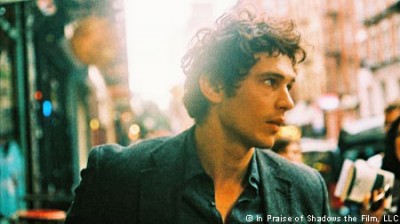| Reviews & Columns |
|
Reviews DVD TV on DVD Blu-ray 4K UHD International DVDs In Theaters Reviews by Studio Video Games Features Collector Series DVDs Easter Egg Database Interviews DVD Talk Radio Feature Articles Columns Anime Talk DVD Savant Horror DVDs The M.O.D. Squad Art House HD Talk Silent DVD
|
DVD Talk Forum |
|
|
| Resources |
|
DVD Price Search Customer Service #'s RCE Info Links |
|
Columns
|
|
|
William Vincent

Reviewed at the 2010 Tribeca Film Festival
I'm not sure how director Jay Anania and cinematographer Daniel Vecchione achieved the specific look of their film William Vincent, but whatever they did, it worked. There's a remarkable density to the images; the blacks seem deeper, richer than in other films, thicker and more detailed, adding a uniquely vibrant feel to its New York locations. What's more, they appear, in the camerawork, to be going for (and pulling off) the sleekly intimate New-York-Wave look of Soderbergh's The Girlfriend Experience. The film is never less than handsome; every frame is lovingly composed. The trouble is that, as much as Anania appears to know exactly how to achieve a look, he has no idea how to tell a story. Through the first half-hour or so, you can't decide if he's building up to something really interesting, or boring us with general pretentiousness. Unfortunately, it's the latter.
James Franco is the title character, a mysterious drifter who shows up in New York, takes on a new identity for reasons unclear, rents a storefront apartment, and picks pockets for fun (he tosses the contents after he pulls them). One afternoon, a young and powerful gangster known only as "The Boss" (Josh Lucas) observes William in action, and decides he'd like the pickpocket to work for him, running various errands. As an incentive, he offers William the friendship of pretty Ann (Julianne Nicholson) as a "gift," but when William and Ann start to get attached, things go sour. Yep, that's right, William Vincent is apparently an arthouse remake of Mad Dog and Glory.
The film is held together by narration--a lot of narration. Most of it is by William, in the form of a letter he sends to Ann several years later. But he also works as an editor of educational nature films, so we hear the female narrator of those films as he cuts, and then, for a while, suddenly she's the narrator of the film we're watching. How many narrators does this thing need?
However, the montages of ponderous narration and marginally-related visuals are more successful than the turgidly-paced dialogue scenes. While much of the talk is flat chatter, Anania's screenplay does include a few modestly amusing Pinteresque exchanges (William: "What do you do?" Ann: "I do things." William: "Things like what?" Ann: "What I do. So it's that"). The trouble is the pacing; every line is preceded by a pause you can build a house in. Anania seems to have directed his actors to contemplate and reflect on every thing they say, before and after they say it, so they're up there doing all this damned acting, and we're checking our watches. If they took out all the pauses, the movie'd run about 20 minutes.
Some of the performances are interesting. There's a haunted quality to Franco's man of few words turn; he's ultimately left flailing, but early on, he has one entire good sequence, a charming bar encounter with a random pretty girl (well-played by Zoe Lister Jones, who would be a star by now if more people had seen Breaking Upwards). But William (or whatever his name is) is basically an enigma, with Fracno inside him struggling manfully for things to latch on to. Nicholson, so good as the wounded lead in Brief Interviews with Hideous Men, finds some deliberate shadings within her one-dimensional role. Lucas is pretty much forgettable, but as his right-hand man, Martin Donovan--who is not the most likely choice to play a heavy, being mostly known for milquetoast roles like Christina Ricci's brother in The Opposite of Sex--ends up creating one of the most nuanced things in the picture.
Even the distinctive look doesn't always work; there's a couple of scenes early on where you can't make out a damned thing, and some key shots later that seem designed for the sole purpose of making the audience nod and murmur "ah, the symbolism" appreciatively. And this stylization has its drawbacks--one of the final scenes is lit only from above (perhaps from a single source), and the light falls in such a way that we can't see either of the characters' eyes, in a moment were it is really, really important that we do. Instead we just get empty black holes in the shadows of their brows. In some ways, however, it's an appropriate and symbolically appropriate ending for William Vincent: the look comes first, the emotion and narrative a distant second.
Jason lives in New York. He holds an MA in Cultural Reporting and Criticism from NYU.
|
| Popular Reviews |
| Sponsored Links |
|
|
| Sponsored Links |
|
|
| Release List | Reviews | Shop | Newsletter | Forum | DVD Giveaways | Blu-Ray | Advertise |
|
Copyright 2024 DVDTalk.com All Rights Reserved. Legal Info, Privacy Policy, Terms of Use,
Manage Preferences,
Your Privacy Choices | |||||||











